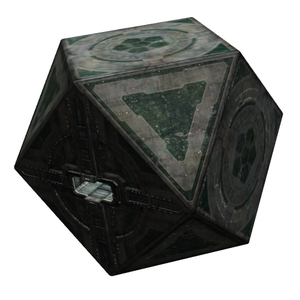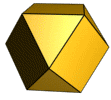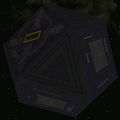Difference between revisions of "Coriolis Station (Oolite)"
Cholmondely (talk | contribs) m (→Links: Another!) |
Cholmondely (talk | contribs) (→Design: Link to flavour text) |
||
| Line 17: | Line 17: | ||
[[Image:cuboctahedron-anim-aka.gif|left]] | [[Image:cuboctahedron-anim-aka.gif|left]] | ||
| − | Though Coriolis stations are by laymen referred to as 'hexagonal in approximate shape', they are in fact cuboctahedra. How the designers initially came to discover the superior solidity inherent in this geometric shape is only speculation, but there is little doubt that their course was staked by the scientific trend of exploring geometric simplicity that signify those times. One unlikely account concerning the Coriolis' conception contends it was a GASEC janitor who presented a model of his own to a scientist in an heated argument over the designs, shouting "cause if it's got movable parts, it's liable to break!" | + | Though Coriolis stations are by laymen referred to as 'hexagonal in approximate shape', they are in fact cuboctahedra. How the designers initially came to discover the superior solidity inherent in this geometric shape is only speculation, but there is little doubt that their course was staked by the scientific trend of exploring geometric simplicity that signify those times. One unlikely account concerning the Coriolis' conception contends it was a [[GASEC]] janitor who presented a model of his own to a scientist in an heated argument over the designs, shouting "cause if it's got movable parts, it's liable to break!" |
The shift in space station science that inevitably came about would later influence the [[Dodo station (Oolite)|Dodecahedron station]] and [[Icosahedron Station (Oolite) | Icosahedron station]] designs. Later structures like the [[Torus station]] would abandon this tradition for dubious reasons. | The shift in space station science that inevitably came about would later influence the [[Dodo station (Oolite)|Dodecahedron station]] and [[Icosahedron Station (Oolite) | Icosahedron station]] designs. Later structures like the [[Torus station]] would abandon this tradition for dubious reasons. | ||
The Coriolis stations landing dock size is the standard; 192m x 64m x 250m (WxHxL) | The Coriolis stations landing dock size is the standard; 192m x 64m x 250m (WxHxL) | ||
| + | |||
| + | See lengthy descriptions from [[the Dark Wheel]] & [[Imprint]] in [[Coriolis Station (Classic)]]. | ||
== Variants == | == Variants == | ||
Revision as of 18:08, 31 January 2021
| Coriolis Station | |
|---|---|

| |
| Size (metres, W×H×L) | 1000 x 1000 x 1000 |
| Manoeuvrability | Roll: 8.0 Pitch: 8.0 |
| Rotating | Yes |
| Energy recharge rate | 100 |
| Armaments | None |
| Defenders | GalCop |
| OXP or standard | Standard |
| Beacon | N |
Overview
The first operational Coriolis station was seen in orbit around Lave in 2752, presenting the uniform standard of GalCop space ports for years to come. Designed at the GASEC (Galactic Astronautic and Space Exploration Center) laboratories at Vetitice (around which the semi-functional prototype still orbits) it represented a milestone in space habitat achievement. As previous, far more vulnerable old-school designs were proven surprisingly inferior, and the economic strength of the Galactic Co-operative flexed its new muscles, an unprecedented boom across the known galaxies saw Coriolis stations simultaneously constructed in massive numbers.
Design
Though Coriolis stations are by laymen referred to as 'hexagonal in approximate shape', they are in fact cuboctahedra. How the designers initially came to discover the superior solidity inherent in this geometric shape is only speculation, but there is little doubt that their course was staked by the scientific trend of exploring geometric simplicity that signify those times. One unlikely account concerning the Coriolis' conception contends it was a GASEC janitor who presented a model of his own to a scientist in an heated argument over the designs, shouting "cause if it's got movable parts, it's liable to break!"
The shift in space station science that inevitably came about would later influence the Dodecahedron station and Icosahedron station designs. Later structures like the Torus station would abandon this tradition for dubious reasons.
The Coriolis stations landing dock size is the standard; 192m x 64m x 250m (WxHxL)
See lengthy descriptions from the Dark Wheel & Imprint in Coriolis Station (Classic).
Variants
As the Coriolis stations became 'common sight' in the 8 Galaxies, local developers started to develop more variants. It was often the case that certain life-forms needed adaptations or the stations where altered for artistic reasons. See analysis here: P.A. Groove Stations backgrounds
Politics
Attempts by planetary governments to claim sovereignity over its space ports have rarely been successful, as GalCop has enforced a strict policy to maintain joint station custody, which in effect places it under GalCop authority. By law, a Coriolis or any other GalCop station is politically neutral territory.
Habitat
Being the oldest stations, Coriolis station societies are known to often display wide varieties of humanoids and their well-established cultures, who find the gravitational and respiratory conditions fit for living.
Custom Paintjobs
Links
See also:

